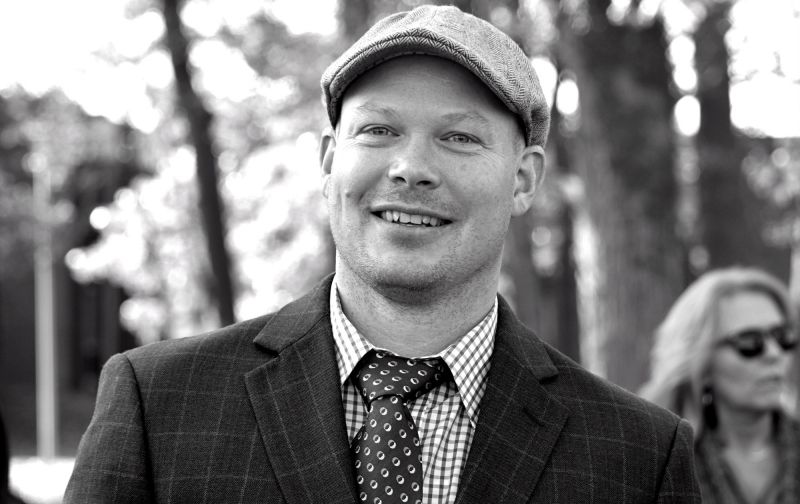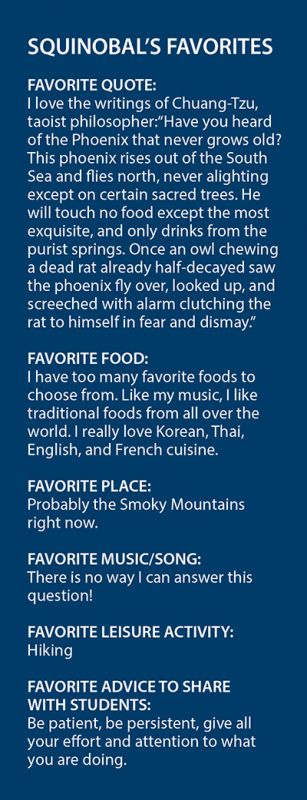Share this Story
Focus on Faculty: Jason Squinobal
Building VWU's instrumental music program has been a focus for this jazz saxophonist
University News | April 10, 2019
 For VWU Assistant Professor of Music and Director of Instrumental Music Jason Squinobal the best thing about studying music is that you are never done. That is, if you do it right, he says. He believes that you are always a student of music and that there are always ways to improve as a performing musician.
For VWU Assistant Professor of Music and Director of Instrumental Music Jason Squinobal the best thing about studying music is that you are never done. That is, if you do it right, he says. He believes that you are always a student of music and that there are always ways to improve as a performing musician.
Squinobal, who first came to Virginia Wesleyan in the fall of 2015 to build an instrumental music program for the University, has been playing the saxophone since the fourth grade. He credits an excellent instructor for “hooking” him on music. That early experience launched his love of music and led to incredible opportunities for his musical future.
Before coming to Virginia Wesleyan, Squinobal was the director of Jazz Studies at the University of Minnesota, Morris for three years. He holds a Bachelor of Music degree from Berklee College of Music in Boston as well as a Master of Arts degree and a Ph.D. in Ethnomusicology from the University of Pittsburgh. The talented jazz saxophonist has performed all over the United States and internationally in England, Canada and Jamaica.
What did you want to be when you were growing up?
When I was really young I wanted to be an archaeologist, probably because of Indiana Jones. Then in the fourth grade I began to play the saxophone and ever since then I wanted to be a professional saxophonist. I studied ethnomusicology, which is the study of music and culture, in graduate school. To me ethnomusicology is sort of like a combination of archaeology and music, so in a way I feel like I’ve been able to do both.
 How did you land where you are?
How did you land where you are?
I’ve been very lucky in that I’ve had some really fantastic opportunities in my musical life. I graduated from Interlochen Arts Academy, which is an internationally recognized performing arts high school. It was an intense experience because everyone there was very serious about their art, and we would push each other to be the best we could be. I then went to Berklee College of Music in Boston for my undergraduate degree, and to the University of Pittsburgh for a Ph.D. in Ethnomusicology. Along the way I have always been a jazz saxophonist. I’m originally from the East Coast and Minnesota was a long way away from friends and family. Virginia Beach is a much better home base for me.
What's the best thing about your field?
There are so many fascinating things about music, but my two favorites are: first, that different musics from around the world are both so different from each other and at the same time there are so many similarities. The second fascinating thing about music is that it spans the gap between science and faith. To truly master music you must master both the tangible, natural, scientific elements of music and, at the same time, you must master the intangible elements of artistic expression.
How would you describe your teaching style or philosophy of education?
I like to think of my teaching style as intuitive. Music is such a broad field, and my students come to me with such different musical experiences-- each student has different strengths and different weaknesses. There is no one-size-fits-all music education; each student needs something different to help them achieve what they have set out to do. It’s my job to read my students, to know where their weaknesses are and to help them realize their strengths. I want them to learn how to enhance their strengths and improve their weaknesses so that they become complete musicians. Some of my educational philosophies are that students must give 100% effort; active participation is vital; music is not a passive educational experience; and finally, everyone must have patience, as music takes a lifetime of 100% effort and active participation to master.
What does it take for a student to be successful in your class?
You don’t need to be the best music student to be successful in my class. Students need to be active participants who give 100% effort and full attention to class. In fact, it’s the students who are willing to work the hardest and who find music a challenge who seem to be the most successful in the music world.
How do you most want students to remember you?
I want students to realize that we all want them to be successful. Everything we do as teachers is intended to help our students to succeed. As they make their way through a musical life, if students realize that all the hard work they put into my classes have helped them to be prepared and successful, then I’m happy.
What do you consider to be indicators of a successful career/life?
If you are happy, content, and yet still challenged and motivated by what you are doing, then you are having a successful career.
Current projects/research?
Currently, I’ve been composing more original music and I am establishing a group of musicians in the area that I feel inspired to perform with. Over the past four years, I’ve focused the majority of my creative activities on building the instrumental music program here at VWU. I have had to compose and arrange the majority of music the ensembles perform, and most of my creative time has gone to that. I feel like the music program has grown to a point that I can start to compose and perform for my own groups again.
Interests and Hobbies—what floats your boat?
I love to cook; I love to read, and to go hiking in the mountains. And, I’m a big rugby fan.
How do you like to spend your time?
For me spending time alone, solitude, is so precious to me. I believe creative artists need solitude and a break from the stimulus of the world to tap into their inner voice, their creative spark, at least that’s what I need! I always have my most creative moments in quiet solitude.
Greatest accomplishment to date?
I truly believe that my greatest accomplishment to date, is that I’m still making my way in music. Music is such a challenging profession that if you can make a living making music, then you have accomplished something great. When I was at Interlochen Arts Academy and Berklee College of Music there were so many great musicians, who were much more talented than I was. A small group of them are still making music; so many more of them have gone off to make a life outside of music. I am very lucky to be a part of the small group who is still making their way in music.
If you weren't a professor, what would you be?
I could be an architect, a chef, even a national park ranger; a lot of things! But whatever I did, it would have to be something I could be creative in, and I would have to have the freedom to make most of my own choices.

